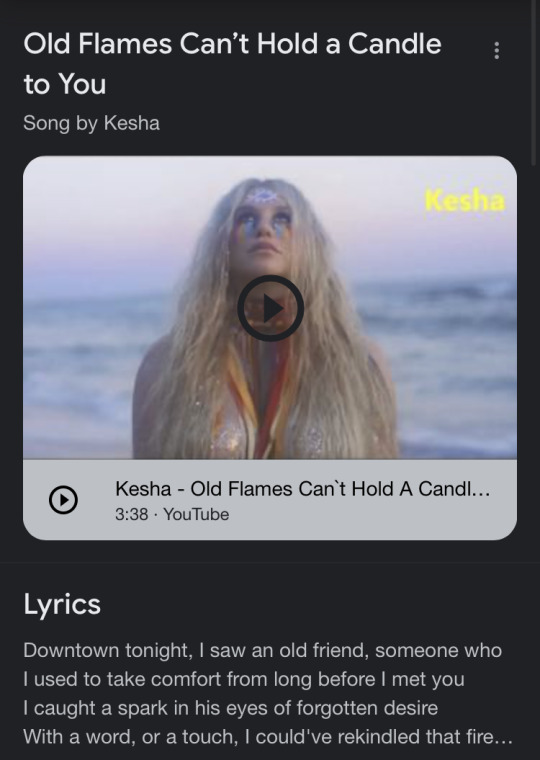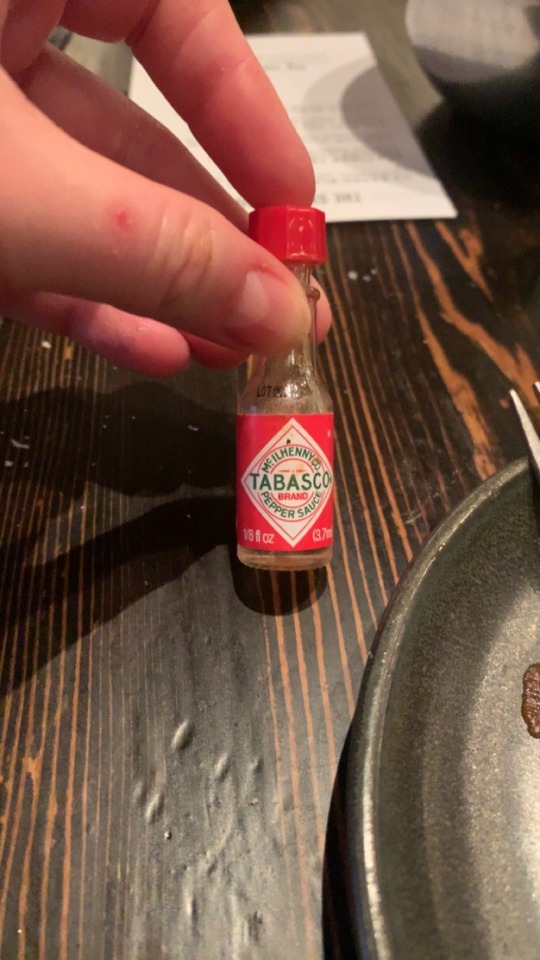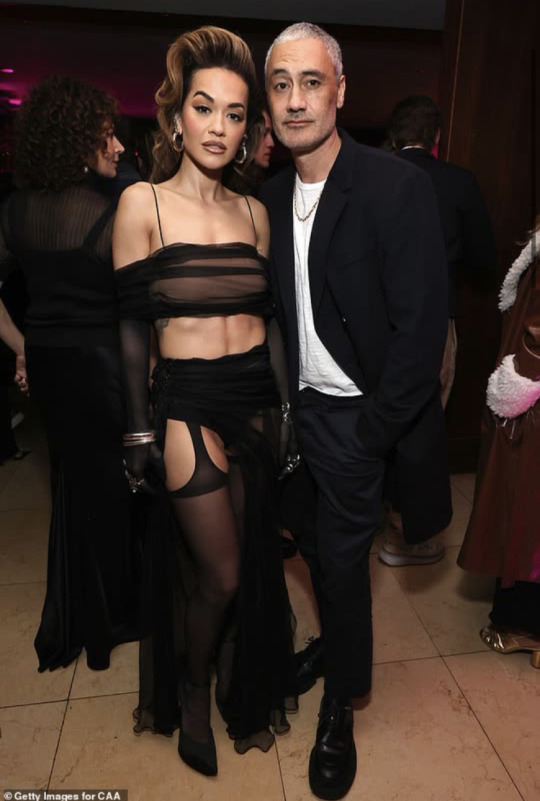#patryn
Text


I always wanted to redraw an older sketch/artwork of mine to see my progress and I also wanted to draw a more detailed version of my boy Sang-drax. So why not both?
The first one is from today, the second one from 2003.
And still loving both drawings ❤️🐉🐍
I struggled a lot with my art style in the past bc it was never (and never will be) an art style for the masses. Not beautiful or stereotypical enough but I've made my peace with it. Bc I spent years to draw the way I'm drawing now and I can be proud of it! Seeing the development between these 2 pics also shows me that it's worth it to work for the things you love ❤️
#sangdrax#sang drax#sang-drax#death gate cycle#Haplo#margaret weis#tracy hickman#patryn#sartan#hand of chaos#dragon snake#shapeshifter#art progress#now vs then#traditional art#stormlanternsart#stormlanterns#lineart#outlines#fantasy
8 notes
·
View notes
Text
Lying in bed crying about Alfred's fucked up identity situation
#usually im like. Understandable But Still Yuck about his Samah Apologisms in the epilogue#but i read a quite good Luke Grappling With Vader fic and while not directly applying it did make me think#about how much i feel it's because of how Alfred still measures himself compared to Samah#in a fucked up way.#and how so much of his Issues- this is about the serpent mage emotional abuse but also In General i think he definitely#has some childhood baggage that the whole Last Sartab This Is All On You thing only. Enhanced into the complete. emotional ruin we meet#but all of that. All Of That is about Inadequacy it's about not being Enough in a society that justified it's crimes by its perfection#and then he detaches himself from that and chooses to align himself with the patryn. and.#you know. like. the sartan goverment did do awful things and v much everyone is complicit in privilege ways#but People Are People is the point of the series but the point of the series is also it takes time to drill that point in and this kind of#trauma and hesitance of the oppressed group is v reasonable and worth respecring in some ways.#you know realisticlly he's gonna have to smile politely while people accept his existence as An Outlier To The Still Ancient Enemy cuz#'you aren't really... (vauge handwave at all his stuff) A Real Sartan' and he isn't going to DEFEND HIS EMOTIONAL CONNECTION TO SARTANESS#TO A BUNCH OF LABYRINTH DWELLERS HE'S BARELY GONNA SEE AGAIN.#like even if he wasn't World's Most Confrontation Averse- who would do that#so he's just. yknow. forced to qgain internalize in a way this basic fear or belief he has#and even if he can now build himself a self worth that isn't tied to being A Good Sartan- and he can and he will-#that's still tearing something away so much from a new direction?#AND DON'T GET ME STARTED HOW THIS. LITERALLY CONNECTS WITH HAPLOS CORE CHARACTER CONCEPT#MAN WHO SHREDS HIMSELF TO BITS TO BE WHAT HIS SOCIETY WANTS A PATRYN MAN TO BE AND NOTHING MORE#AND. (gender redacted) who CAN'T. who is too much of all the wrong things but too little of the right ones-#actually no that's the goddamn serpent mage he IS a sartan ideal but#he isn't Granted that.#idk. he's just. his home is a person because they are literally so woven together into one story#but also. haplo very much gets his own community still belonging in and his love interest and. and Alfred just kind of has this.#both worlds and neither situation.#& hes disabled and effeminate and His People are gone and his people are right across the street and may or may not be inventing new slurs#for him.#OH AND HE GETS A GOOD PERFECT USEFUL BODY HE ISN'T SUPPOSED TO OVERUSE OR GET ADDICTED TO THE SOCIAL ACCEPTANCE OF.#just. how do you expect him to believe Samah was wrong about him if everyone agrees- he just Can't Be Enough?
5 notes
·
View notes
Text
#death gate#death gate cycle#i think this is literally every single patryn we meet except like. kari#which. kinda surprising tbh
6 notes
·
View notes
Text
Tagged by @jacobime 🥰
Lock Screen, last song listened to, last picture taken, last picture saved




I love my basic-ass default lockscreen you can pry it from my cold dead hands (I redownloaded it after my iphone auto-updated and it disappeared from the options). Last song I listened to was actually on a CD in my car on the way home from work. Last picture taken was of the teeny weeny bottle of tabasco at dinner Wednesday night. Last picture saved was of Rita looking sexy and Taika looking exhausted at some Oscars-adjacent party (I really don't save a lot of pics, and if anything this is a reminder to delete this one lol).
tagging @moggat @jisa-patryn @latriviata @falsewings
3 notes
·
View notes
Text

4 notes
·
View notes
Text
Canadian Province Asks QuadrigaCX Co-Founder to Explain His Wealth in New Order
The Canadian Province of British Columbia is seeking to use an unexplained wealth order, a new type of court order that compels a person to explain how they acquired their assets, to target the co-founder of QuadrigaCX, Michael Patryn.
“Today, we have filed our third unexplained wealth order application with the British Columbia Supreme Court,” Mike Farnworth, the Province’s Minister of Public…

View On WordPress
0 notes
Text
Ask 10 different people to define a decentralized autonomous organization (DAO), and you’ll likely get 10 different definitions. But there is at least one thing most agree on: DAO governance is a mess. At best, it’s an experiment in the works.
According to DeepDAO, DAOs today handle a whopping $17.2 billion in value. Yet many DAOs managing millions of dollars have proven hopeless at heeding even the most basic of lessons in business management 101. One does not have to look too far in the annals of crypto history to recall major DAO catastrophes.
Recall Wonderland DAO, an Olympus fork that birthed arguably one of the most notorious scandals in DAO history. At its peak, Wonderland enjoyed a near $2 billion in total value locked, which came to a skidding halt in January 2022 when its treasury manager — who went by the pseudonym 0xSifu — turned out to be none other than Michael Patryn, co-founder of the failed crypto exchange QuadrigaCX and a convicted criminal for financial fraud.
Or consider a more recent exploit with the Solana-based trading protocol Mango Markets. In October, attackers exploited the DAO’s loosely governed parameters to acquire a disproportionate chunk of the DAO’s MNGO tokens. In an absurd turn of events, the attacker proceeded to propose on governance forums an offer to return half their heist in exchange for the DAO not to prosecute him, then voted “Yes” on it with the stolen tokens. The vote eventually failed, but Mango still ended up paying off $47 million to the attacker.
A governance proposal on Mango Markets. (Twitter)
Case studies of DAO failures are not exclusive to outrageous one-off spectacles like the ones above. Despite the Libertarian rhetoric of self-sovereignty and self-custody, dozens of DAOs that kept their monies on centralized exchanges also saw their treasuries implode during the carnage of 2022’s blow-ups like FTX.
The truth is, DAO governance isn’t easy. Founders have to balance a multitude of priorities, like solving voter apathy, committing to decentralization and product market fit. A “best practices” manual doesn’t exist, and where there is one, it’s not widely shared.
The good news? Die-hard DAOists are hard at work to rid these problems, one experiment at a time.
The problem of voter apathy
Take voter apathy, for instance, arguably DAO governance’s most widespread problem. As a “decentralized” community, tokenholders must vote if they desire resilient protocols. But token holders don’t vote because it takes time. When voters do turn up at the voting booth, or Snapshot, they lack the expertise or context to make an informed decision. Worse still, voters who care may not even be aware of a vote until it’s over.
To combat voter apathy, a burgeoning landscape of DAO infrastructure tools has been developing tools to streamline DAO voting into one-stop platforms. Products such as Senate and Goverland are trying to aggregate governance proposals across dozens of DAOs with direct integration on popular voting platforms, such as Snapshot and Tally.
Senate founder Paulo Fonseca tells Magazine, “At present, it’s cumbersome for most DAOs to see off-chain and on-chain voting separately on different platforms. One of our product’s key value-adds is simply for users to consume all the information on one page.”
Because governance proposals typically open to vote for a limited duration, Goverland, in turn, is putting a strong emphasis on mobile integration so voters are notified in time. “It all starts with an in-time notification. With mobile, it’s far more convenient to help boost voter participation,” Goverland founder Andrey Scherbovich tells Magazine.
Others believe that for DAO governance to improve, it needs to go beyond pure token-based voting based on duty. JokeRace, a voting protocol that aims to make governance “fun,” was designed with this goal in mind.
good example is this contest by @lifiprotocol for $400 they got community to:— use product
— share features they want
— prioritize those features
— share contest publicly to try to win
— generate data on power users
— feel personal involvementhttps://t.co/DqrVg1xsla— david phelps 🐮🏰🃏🐘 (@divine_economy) August 28, 2023
Instead of expecting thousands of tokenholders to vote, JokeRace is exploring the use of incentivized “contests” that allow governors to gate voting proposals in any way possible via a highly customizable allowlist, from a fully public forum to select DAO participants. Co-founder Sean McCaffery tells Magazine:
“Many DAO projects want to give non-financial utility to their token. What we are doing is opening a horizon on top of simple token voting and incentivizing people to hold tokens for more than just speculative reasons.”
“For a highly technical proposal that wants to draw on the wisdom of experts or loyal fans, a creator can gate the vote around criteria, such as minimum liquidity provision for three months or holders who have held the token for at least a year. It enables everything from low-commit fun ‘GM contests’ to serious proposals where only active contributing DAO participants can vote,” he adds.
In short, JokeRace strives to reimagine governance right down to the bottom social layer.
Delegate voting
To thwart low voter turnouts, DAOs are also turning to the real world of public governance for wisdom. One such tried-and-true method that has caught on in the past year is delegation, where tokenholders entrust voting rights to delegated “politicians” or “stewards” who would vote on their behalf.
From a PR perspective, delegation is nice in that DAOs get to have their cake and eat it, too. It allows the DAO to scale faster without having to pass all decisions through months of debate. DAOs also get to deflect the criticism of “insufficient decentralization” since tokenholders are technically expressing a demonstrated preference to vote, albeit indirectly.
Most major DAOs today have embraced delegation voting, and while it’s helped voter apathy to some extent, it’s hardly a silver bullet. Delegation voting in itself has surfaced with problems. For instance, delegation can descend into a popularity contest where voters simply assign tokens to popular Twitter influencers or familiar company names.
“An experiment that could be worth trying is to have delegates vote specifically on their domain expertise rather than making them responsible for voting on every single DAO decision — which range from complex technology to finance — too wide of a range for robust decision making,” Kate Beecroft, governance lead at Centrifuge, tells Magazine.
Moreover, delegate voting suffers from apathy in itself. Delegates themselves don’t turn up on election day. According to Karma’s research, at least 53% of delegates in major DAOs have failed to even cast a single vote. Or it could lead to situations where voting decisions are the result of collusion made behind closed doors for mutual political gain.
For instance, a16z famously delegates voting powers to “blockchain university clubs.” While the venture fund claims that student clubs are “free to participate in governance however they see fit,” it’s not immediately clear what the relationship between these entities is.
Gitcoin founder Kevin Owocki insists that delegating voting is a step forward for DAO governance but also acknowledges its shortcomings. Gitcoin launched a fairly egalitarian airdrop to around 25,500 holders in 2021, but its decision to incorporate delegate voting saw a concentration of voting power back into the hands of only about 100 delegates. On top of that, delegates cycle in and out of activity over time, and even getting tokenholders to reallocate their delegation from inactive delegates every half a year was difficult.
“The problem that confronted us was keeping delegates engaged, accountable and slowly changing the DAO into a liquid democracy of dedicated Gitcoin community members that cared about our core vision of decentralized public funding,” Owocki states.
These problems are being recognized by builders in the DAO tooling, trying to improve delegate accountability. For example, tools like Karma have emerged to create transparency around delegation voting by aggregating all the information about delegates, including their voting weight, forum activity and voting history, on one page.
A snapshot of Gitcoin delegates using Karma. (Gitcoin)
The DAOmeter dashboard, a DAO maturity rating index by StableLab, also serves as a useful DAO public good for assessing the decentralization journey of DAOs.
StableLab’s DAOmeter dashboard assesses DAOs on organizational maturity across various factors. (DAOmeter)
StableLab founder Gustav Arentoft tells Magazine, “During the bull market, lots of DeFi DAOs branding themselves as ‘decentralized finance’ suffered exploits because they lacked even basic governance. The operational structure of these protocols was extremely opaque. As an individual, assessing the decentralization of DAOs was difficult and requires some form of standardized parameters, which is what DAOmeter tries to provide.”
Ultimately, despite the popular notion that DAOs are “autonomous,” the reality is that much of it can never be fully autonomous and enforceable on-chain.
“You can have all the on-chain votes you’d like, but lots of DAO operations come down to the social layer. Who owns the GitHub account? Who controls the DNS [domain name system]? Who is in-charge of handing over a password to the elected personnel?” says JokeRace’s McCaffery.
Growth
While DAOs struggle to decentralize, many seem to forget that they are still fundamentally profit-oriented organizations. That means that DAOs can’t afford to forget about revenue and growth.
To scale, DAOs centralize some decision-making in the hands of experts. One trendy idea in the past year that DAOs have been experimenting with is “working groups.” In DAO nomenclature, they also go by subDAOs. Metropolis (previously Orca Protocol) calls them pods. Maker calls them core units, and Gitcoin calls them workstreams.
These structures resemble the ubiquitous M-shaped organizational structures in modern capitalism today. Historically, the capitalist firm was a centralized U-shaped firm with decision-making power concentrated in the hands of a few top executives. As the firm expanded into regional markets, it grew increasingly incapable of managing the rapidly increasing scope of complex administrative decisions.
The multi-divisional structure of the modern firm. (SlidePlayer)
To remain nimble and adapt as the firm grew, the modern capitalist firm underwent a structural decentralization, empowering mid-level managers with the autonomy to run the local branch as they deem fit. Pioneered by General Motors president Alfred Sloan in the 1920s, this crucial organizational innovation allowed firms to overcome knowledge problems and also aligned the incentives and rewards to lower management, effectively allowing them to work as “mini-entrepreneurs” within a large corporation.
DAOs are witnessing the same tendency toward a similar organizational structure, except that it’s evolving bottom-up from a dispersed, decentralized status quo.
James Waugh, co-founder of Fire Eyes DAO, tells Magazine, “In advising many DAOs, we sometimes recommend the setup of working groups to focus on certain areas that are hypercritical, particularly those involving technical work where smart contracts need timely upgrading.”
“Yet it’s entirely common for redundant working groups to exist and to be a complete waste of time, however. Whether or not they’re efficient really depends on the kinds of people in them.”
Decentralization maxis also complain that too many working groups and managerial experts might mean less transparency over how DAOs operate. It’s a complaint that isn’t completely without merit.
“In the early days of Bankless DAO, many internal project managers requested for funds then delivered work of questionable value. We implemented
a variety of solutions like reputational systems within Discord, KPI-based funding and timelocks to deter rent seeking,” Frogmonkee, an early core contributor of Bankless DAO, tells Magazine.
Ultimately, DAO governance boils down to the fact that DAOs are made up of a pluralistic archipelago of individuals with different value preferences and priorities. Some wish to pump their holdings in the short-term, while others are interested in the long-term health of the project. Some are genuinely altruistic actors, and then there are delegates exchanging favors under the table by agreeing to vote on each other’s proposals.
Dual governance structures
In such a marketplace of conflicting values, a clear separation of powers can help foil potential insider collusion. Some DAOs are actively experimenting with such “dual governance” models, such as Optimism’s “Token House” and “Citizen House.” OP tokenholders and delegates occupy the former, while the latter is an identity-based community of “citizens” with soulbound tokens that acts as a check and balance on the Token House.
Optimism’s dual governance house structure. (Optimism blog)
Shawn Grubb, a delegate at Gitcoin, tells Magazine, “Optimism’s experiment with bicameral houses is a smart way to segregate the various stakeholder groups: the tokenholders who care about pumping their bags, the active contributors with a job, and the broader community who believes in Optimism and seeks project funding. The key is balancing the power of different stakeholder groups rather than the plutocratic status quo, where plutocratic tokenholders reserve only the power.”
Optimism isn’t alone. In recent months, a group of Lido insiders have taken it upon themselves to push for a similar dual-governance model. The problem stems from Lido’s wildly successful liquid staking product, stETH, which controls a market share of 32% staked ETH. This poses a looming threat to the underlying security of the Ethereum layer 1, as it comes dangerously close to the 33% consensus threshold, which could theoretically allow Lido to exercise control over Ethereum’s consensus layer. In June 2022, Lido DAO proved that self-regulation was not forthcoming after it unanimously shot down a vote to self-limit its stake flow.
Lido’s proposed dual governance structure would, in theory, bring the DAO back into alignment with the interests of the Ethereum protocol. This is done by granting Lido users (stETH holders) veto power against the DAO, a feature that competitor liquid staking protocol Yearn.finance has also implemented.“For Lido, dual governance (and implementing staking routers) should be its next logical steps. It alleviates many of the current concerns around the DAO,” said Hasu on the podcast.
Finding a balance
In sum, DAO governance isn’t easy. Driving growth while committing to decentralization is no small feat, and it will take many years before governance reaches equilibrium.
Yet the philosophical principles that blockchain organizations embody — decentralization, transparency, egalitarianism — are all values very much worth striving for. After all, it’s unheard of for a multimillion-dollar company in the traditional business world to be debating operational strategies openly on a forum or that allows anyone to enter and begin contributing without going through a tedious interview process.
Even in its imperfect state, the open and transparent context in which DAOs operate is perhaps the biggest bulwark against the centralization of power.
Source
0 notes
Text
SushiSwap revealed early pledge however has actually been consistently thwarted by internal chaos and continuous mismanagement. Key Takeaways While it began strong, SushiSwap has actually faced a number of highly-publicized internal issues in its brief life-span. It has actually continued to suffer throughout2022 The procedure's brand-new CEO comes with his own luggage. Sushi began strong however rapidly went off the rails. Bad Mangement When I started my crypto journey in late 2020, among the very first tokens to capture my eye was SUSHI. I had no concept what DeFi was or how wise agreements worked, however the streamlined purple and pink ombre logo design stuck out amongst the rest. From that preliminary interest, I discovered the job's vibrant history, "the DeFi summertime" of 2020, and why decentralized financing is so crucial. Sushi is among lots of so-called "decentralized exchanges"-- permissionless procedures that let DeFi users switch tokens without going through a central exchange or intermediary. Here, liquidity suppliers deposit tokens into trading swimming pools and make a share of the swap costs for securing their possessions. The appeal of decentralized exchanges like Sushi is that they can work individually from individuals who produced their wise agreements. Sushi was struck by its very first significant scandal early in its life time. After roaring into the DeFi area and bring in liquidity through its generous SUSHI token emissions, the procedure's pseudonymous developer, referred to as Chef Nomi, disposed $14 million worth of SUSHI from the procedure's advancement fund prior to leaving the job. Nomi later on returned the funds to the Sushi treasury, lots of users ended up being cautious of the task's management, which set a bad precedent. As DeFi grew throughout 2021, so did the drama surrounding Sushi. In September, 0xMaki, frequently mentioned as one of individuals accountable for conserving the procedure after Chef Nomi's departure, unexpectedly left the Sushi group. It would later on be exposed that 0xMaki was by force gotten rid of from Sushi as part of a supposed hostile takeover. Other significant names to leave the job consisted of core designers Mudit Gupta, 0xKeno, and LevX. Sushi's then CTO Joseph Delong likewise dealt with pressure from a number of internal disagreements due to the fracturing of the procedure's group. Sushi's service advancement lead, AG, implicated Delong of abuses of power-- prior to being fired "for an ongoing pattern of habits that produced a hazardous office." A rekt.news examination then implicated Sushi staff member of costs treasury funds on steak and lobster suppers, video gaming an allotment of tokens from MISO's BitDAO sale, and day trading utilizing procedure funds. Delong resigned in December 2021. For much of 2022, Sushi has actually been stuck in limbo. A strategy to join the procedure with Daniele Sestagalli's abracadabra.money provided the SUSHI token a quick cost bump, however this failed after it was exposed that serial fraudster Michael Patryn (otherwise referred to as 0xSifu) was the treasury supervisor for among Sestagalli's other tasks. A current vote for a brand-new Sushi CEO guaranteed to breathe life back into the task and put it on a brand-new trajectory. Unfortunately, Sushi simply can not capture a break. Whether the procedure is experiencing widespread corruption or incompetence is uncertain, however SUSHI token holders chose to choose Jared Grey as the procedure's brand-new CEO. Beyond a particular ridiculous meme that's done the rounds on CT over the past 24 hours, it's not tough to discover Grey's questionable past with simply a little bit of digging. He's been at the head of numerous unsuccessful tasks, among which involved Grey's service partner Kevin Collmer
taking funds from consumer accounts. What's more, 2 equity capital companies-- GoldenTree and Cumberland-- brought the vote to put Grey in charge, comprising over 61% of the overall ballot power.
I'll leave you all to draw your own conclusions from this. Sushi was when an appealing procedure and a genuine competitor to the leading decentralized exchange Uniswap. Regardless of all the drama, Sushi still gets a good quantity of trading volume and is the 19 th most significant DeFi procedure by overall worth locked. Compared to other exchanges, Sushi looks underestimated when thinking about the ratio in between the quantity of trading volume it manages and its token cost. Sushi will likely stay a core procedure in the wider DeFi environment, its history of bad management and debate will be extremely difficult to shed. Disclosure: At the time of composing, the author of this piece owned SUSHI, ETH, and numerous other cryptocurrencies. The details consisted of in this post is for instructional functions just and need to not be thought about financial investment suggestions. All You Need to Know About DeFi's SushiSwap Saga (But Were Afrai ... The SushiSwap legend and its native token, SUSHI, will decrease in crypto history. What started as a tokenized variation of Uniswap has actually spiraled into something a lot more. It advises ... SushiSwap Founder Chef Nomi Returns $13 M in Hijacked Ethereum SushiSwap creator Chef Nomi drained his development's advancement fund for 38,000 Ethereum on Sept. 7, simply one week after producing the task, and moved control over to FTX Exchange's Sam ... SushiSwap Goes Parabolic With 3,000% 3-Month Gains SushiSwap has actually seen substantial gains in regards to exchange volume and market value over the previous 3 months. SushiSwap Fundamentals Have Improved The job's governance token, SUSHI, has actually risen from ... Read More
0 notes
Text
GRB 00101010:
Hey everyone.
Yesterday, I saw a documentary - “ Trust no one”. This documentary is literally the best way to understand why not to trust anything blindly on internet.
The documentary is about a company named “Quadrigo”. It's founder was Gerald Cotten. It was bitcoin exchange platform where users can buy and sell bitcoins. The company was based in Canada. It became very popular when bitcoin went up before 2018. The platform was getting a lot of traffic.
Suddenly a news comes out that the CEO has died in India. All the assets that were there on the platform were accessible to him only and now he is gone with all the private keys. The people started to panic as they were unable to withdraw their money.
Then all started to research to find out what had happened or who is behind all this.
After research a lot of things came out. First, the domain of the platform was not registered by Gerald but some other man name "Michael Patryn". Now this person already had money laundering cases to his other name Omar danani. Now people got the suspicion that this man must have killed Cotten. The discussion related to this cases were being done on different platforms like telegram, reddit. One day Michael joined the discussion group on telegram where he told all the users that he already left the company and has no clue what had happend to cotten but he said that he do not believe that Cotten is dead.
Now since Michael already had a money laundering case against him, therefore, people started to search him on other older sites where these kinds of discussions were taking place. Now another interesting thing came out. A username "Spectre" was involed in major discussion related to Michael. And Michael and Spectre had already done a "S&S Investment" scam.
Then the search for Spectre began. On a black hat site a user with the same name was found and he has changed his name to "Murdoch1337". On further investigation it was found that the name behind username was none other than "Gerald cotten". Till now it was clear that Cotten is a fraud.
Upon travelling to India it was found by the investigating reporter that Gerald has actually died. He had a talk with the doctor who looked after Cotten. This news confirmed that he is dead as sure. But the ask still remains - where did all the money go?
The officer who was looking in this case found out that the were a series of fake accounts created by Cotten and fake assets were added to these accounts. So when the user was buying any bitcoin then gerald would transfer from these fake accounts only. It was more like a Ponzi scheme. So user could see that he has received some tokens but in reality it was fake.
The money deposited by the user was being transferred to different exchanges from the Quadriga wallet. Now Gerald was using users money to trade on different exchanges. Things started to go bad when he started losing money. He lost about 150 million USD. At the same time in 2018 the bitcoin started to fall down and the people started to withdraw but they were unable to do as there was no actual money in their accounts. Now Gerald was himself sending the money to the people who were screaming the most but he was not able to control it. Many people started to panic. And with the death news everyone was shocked.
Cotten also signed his will just 12 days before his death wherein his wife was supposed to get some of his properties.
I was really astonished to see how a man can fool so many people. It gave me a learning that never to trust some company blindly when your own money is involved.
Now talking about the day.
I started the day with lots of energy. Did my exercise routine as follows:
-60 pushups
-Squats 65 ( my new PR)
-Plank (2min20sec: new PR)
I had a great breakfast followed by a movie and other activities. Excited to watch today's India vs South Africa match.
1 note
·
View note
Text
Founder of Failed Crypto Exchange QuadrigaCX Starts DeFi Protocol UwU Lend

Sifu, the pseudonymous co-founder of failed Canadian crypto exchange QuadrigaCX, has started UwU Lend, a decentralized finance (DeFi) protocol forked from Aave.
The project went live on Sep. 21 and has already secured $57.5 million in total value locked (TVL), according to DefiLlama.
Users can borrow against an algorithmic stablecoin named Magic Internet Money (MIM). Decentralized finance is a form of lending that uses smart contracts, removing the need for an intermediary.
Sifu's reappearance comes after a turbulent few years following the collapse of QuadrigaCX. Sifu, whose real name is Michael Patryn, transferred millions of dollars worth of ether (ETH) to now-sanctioned coin mixing site Tornado Cash after his stint as Wonderland's treasurer.
Patryn received a barrage of backlash from Wonderland community members after his identity was revealed, with a public vote to oust him from his role as treasurer securing 87.56% votes.
Wonderland's TIME token is currently trading at $11.29, a far cry from last November when it surged to $9,700 before Patryn's involvement was revealed.
Original Article Here:
Read the full article
0 notes
Text
I joke about this wayyy too much but the thing that makes everything about dragon wing so good is not just the situation themselves but the CONTRAST.
Haplo, wearing Extra sleeve: my disguise is foolproof. The Sartan will never guess what's in their midst until it's too late. Hashtag superspy
Alfred, 15 years of fleshed fake identity and practiced excuses, created specifically so people won't give him a second thought: oh my god I am fumbling this so badly I keep slipping up aaaaaahhh - why is the obvious patryn not Killing Me yet. Huh.
27 notes
·
View notes
Text
Day Eight: In Which Doctor Montbank is Offered The Opportunity To Facilitate a Miracle
Previously: Haplo consults Xar and learns that the cure to the plague resides underground, in the Labyrinth discovered by the Patryns. While Xar prepares to guide him into the Labyrinth, Haplo learns that the Mistresses have their own plans for the fate of the town that seem to revolve around the fate of the mysterious Chalice.
This episode: Alfred gets kidnapped by side quests (again!), climbs lots of stairs, and learns the truth about the Chalice.
#only one more in-game day.................#two more chapters and an epilogue but#if this were a game#it'd be Dawn of The Final Day#the dots. they're connecting (i hope)#also alfred is just very sad in this chapter. love him and clara being tragic together#my fic#fanfic
4 notes
·
View notes
Text
tag 9 people you want to get to know better!
tagged by @thetardigrape
three ships:
gentlebeard
blackbonnet
stedward
yes I'm on my OTP shit rn I'm sorry there's nothing I can do about it
first ever ship:
canon, probably Inuyasha/Kagome. Noncanon probably Sesshoumaru/Kouga [don't look at me please]
last song:
literally just listened to this making another tumblr thingy what makes ed happy
last film:
the menu. it's a trip, guys.
currently reading:
The Girl With Seven Names a memoir about escaping North Korea
currently watching:
jujutsu kaisen (Neil's choice) and the 100 (bc Sarah's been harassing me to do it for literal years)
currently consuming:
water (constantly, never catch me without my water bottle)
just leaving this because it's true and it's true. I drain my 1L nalgene like. So many x per day.
currently craving:
fucking chocolate and cheeze its I ate so goddamn much m&ms last weekend and it rewired my brain
tagging: @ghostalservice @themoonslullabye @zombee @blamebrampton @falsewings @jisa-patryn @toninomontana @chaotic-neutral-knitter @theveriest or anybody else who wants to answer, ignore it if you want and sorry if you’ve been tagged more than once
3 notes
·
View notes
Text
DeFi lending protocol created by ex-QuadrigaCX co-founder surpassed $50M in TVL
DeFi lending protocol created by ex-QuadrigaCX co-founder surpassed $50M in TVL
According to DeFi Llama, UwU Lend, a decentralized finance, or DeFi, protocol that acts as a money market on the Ethereum blockchain, has surpassed $50 million in total value locked (TVL). The non-custodial protocol was created by Michael Patryn, known by the pseudonym “Sifu,” who was the co-founder of defunct cryptocurrency exchange QuadrigaCX.
UwU Lend allows users to earn interest on deposits…

View On WordPress
0 notes
Link
DeFi lending protocol developed by ex-QuadrigaCX co-founder exceeded $50M in TVL #cryptoposts #crypto #usa #business #money #success #cryptomarket #money #bitcoin #forex #investment #millionaire #wealth #invest #trading #cryptocurrency #investing #finance #forextrader #financialfreedom #crypto #investor #blockchain
0 notes
Text
DeFi lending protocol created by ex-QuadrigaCX co-founder surpassed $50M in TVL

Michael Patryn was doxed earlier this year for being the co-founder behind the DeFi project Wonderland, which collapsed shortly after.
from Cointelegraph.com News https://ift.tt/eX3c9gd
0 notes